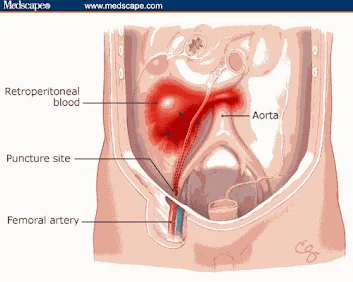What are Signs and Symptoms of Internal Bleeding: 7 Signs And Symptoms Of Internal Bleeding
Internal bleeding occurs because of acute injuries like the dominant force, deep cuts from the sharp objects, fallen from great heights, head injuries or jerks that might damage blood vessels or internal organs. The signs of internal bleeding are not that simple as external bleeding. The person can appear healthy externally, but if we carefully observe, we can see several signs and symptoms of internal bleeding.
READ ALSO: 20 Tips On How To Live Long On Earth
7 Vital Signs And Symptoms Of Internal Bleeding
Signs of internal bleeding are by the place & amount of bleeding, or functions & structures being affected. Therefore, signs and symptoms differ from area and extent of an injury.
1. Vomiting blood
Regurgitating food from the stomach followed with blood stains can be added indication between other internal bleeding signs. The vomitus includes blood which is regularly either crimson red or dark red in the color. It is a mix of food & blood but might sometimes genuinely appear as the blood.
Additionally, blood in the vomit might come from the upper gastrointestinal region like esophagus, throat, & mouth. An occasional but continued vomiting scenes or forceful vomit might cause a tear in small blood vessels that might lead to the appearance of blood in the vomit.
READ MORE: Nausea & Vomiting: How To Stop It completely
2. Coughing blood
Coughing blood involves spitting mucus tinted with blood that can start from the lungs or throat or the respiratory system. This condition has medically called as Hemoptysis. The symptoms often indicate internal bleeding. Normally, the blood is bright red in color & rusty in features.
In many cases, the blood flared excretion that accompanies a cough looks bubbly comprises bubbles for it might consist a mixture of mucus & air from the lungs.
3. Shock
Shock is one of the symptoms connected with severe internal bleeding. Shock is standard as a result of a reduction in blood in the circulatory system.
Symptoms of shock might include improved heartbeat, sweaty skin like fresh, moist skin, low blood pressure & declining mental functions. The signs become more critical when there is sustained blood loss.
Bleeding in the head also promotes in its signs of internal bleeding. It has described by general body weakness, headache, changing mental status, confusion, slurred speech, &vision problems. (How To Stop Heavy Bleeding And Pain From Fibroids)
5. Pain in the Abdomen
The bleeding in internal abdominal may remain hidden & only causes pain. In fact, there is severe blood loss; the affected person may show symptoms of weakness, lightheadedness, shortness of breath, decreased blood pressure & shock symptoms. There could be many kinds of intra-abdominal bleeding.
READ MORE: Why Do I Get Stomach Pains After Eating?
6. Blood Spill Into Peritoneum
When internal bleeding scatters into the peritoneum, it might cause severe pain with even a slight movement, the abdomen becomes stiff & tense to touch as soft tissue of stomach gets swollen. Sometimes, the bleeding will spread towards the skin that has clearly detected on the physical examination. When a bruising symptom appears surrounding the umbilicus, it is called as Cullen’s sign, & bruising in the side region has referred to as Grey Turner type.
While gastrointestinal bleeding, the person spits or vomits out coffee ground color blood or bright red. It happens when the blood has been in the abdomen for a long time.
7. Blood in the stool
Blood in the stool can also be one among of several internal bleeding signs regularly checked. Blood in stool is because of bleeding in the digestive system.
Especially, bloody stool can also be an outcome of bleeding from anywhere in the anus or esophagus. Bleeding in the lower gastrointestinal region is likely to produce bright red blood in the stool. But certain foods such as beets and tomatoes can also make the stool seem reddish.
A simple stool test by the doctor will be needed to ascertain if there is blood in the stool or not. Seldom appearance of blood in the stool makes it seem tarry or black due to an upper bleeding position same as in the stomach, esophagus & also the first part of small intestine. (What Are The Early Warning Signs Of Stomach Cancer?)
When comes to dark blood in the stool, the doctor might refer to the indication as ‘Melena’.
READ ALSO: How To Prevent Sweating After Shower













